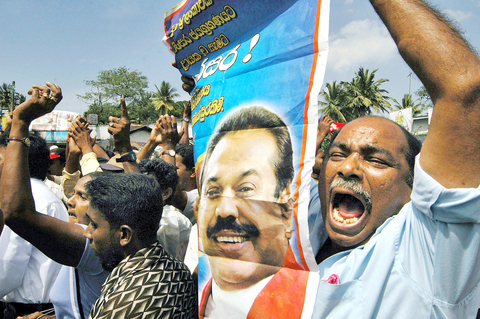Mahinda Rajapakse, who was sworn in yesterday as Sri Lanka's new president, faces the daunting task of forging a permanent peace with the Tamil Tiger rebels or risk a return to civil war on the tropical island.
Rajapakse, whose victory on Friday also coincided with his 60th birthday, narrowly defeated challenger Ranil Wickremesinghe in a vote that was marred by a rebel boycott which prevented thousands of ethnic Tamils from casting ballots.
Chief Justice Sarath Silva was to administer the oath of office to Rajapakse at a ceremony yesterday that comes as escalating violence threatens a fragile 2002 ceasefire.

PHOTO: AP
"He is taking charge of the country at a time when it has been on decline with the regard to the ethnic conflict," political analyst Jehan Perera said.
Unlike Wickremesinghe, Rajapakse took a hard line against the rebels while campaigning for the election, which was seen as a referendum on the peace process.
Rajapakse said that he would never give in to demands by the rebel Liberation Tigers of Tamil Eelam (LTTE) for sweeping autonomy in their strongholds in the north and east.
"The position he had taken during the election campaign will make it difficult for him to reverse the decline" in relations between the government and the rebels, Perera said.
"He needs to get the LTTE into a mutually acceptable framework. If he fails, there is risk of war returning," he added.
The Tigers have not made any comment on Rajapakse's victory but they have accused Sri Lanka's majority Sinhalese of discrimination and say that ethnic Tamils can only prosper in a separate state.
"The ethnic question is already staring at him in the face," the independent Island newspaper said in an editorial yesterday.
"He will have to unveil his plans as to how he is going to deal with the problem which has defied remedies for two decades," the editorial said.
Rajapakse secured support from Sinhalese voters, the most radical of whom oppose any concessions to the Tamil Tigers.
Wickremesinghe, who has favored granting the rebels more autonomy, was overwhelmingly supported by Sri Lanka's Tamil and Muslim minorities.
The Tamil Tigers began fighting for a separate state in 1983. More than 65,000 people were killed before the ceasefire, which led to peace talks that stalled over the Tigers' demands for broad autonomy.
Clashes, though sporadic, have intensified.

Auschwitz survivor Eva Schloss, the stepsister of teenage diarist Anne Frank and a tireless educator about the horrors of the Holocaust, has died. She was 96. The Anne Frank Trust UK, of which Schloss was honorary president, said she died on Saturday in London, where she lived. Britain’s King Charles III said he was “privileged and proud” to have known Schloss, who cofounded the charitable trust to help young people challenge prejudice. “The horrors that she endured as a young woman are impossible to comprehend and yet she devoted the rest of her life to overcoming hatred and prejudice, promoting kindness, courage, understanding

US President Donald Trump on Friday said Washington was “locked and loaded” to respond if Iran killed protesters, prompting Tehran to warn that intervention would destabilize the region. Protesters and security forces on Thursday clashed in several Iranian cities, with six people reported killed, the first deaths since the unrest escalated. Shopkeepers in Tehran on Sunday last week went on strike over high prices and economic stagnation, actions that have since spread into a protest movement that has swept into other parts of the country. If Iran “violently kills peaceful protesters, which is their custom, the United States of America will come to

‘DISRESPECTFUL’: Katie Miller, the wife of Trump’s most influential adviser, drew ire by posting an image of Greenland in the colors of the US flag, captioning it ‘SOON’ US President Donald Trump on Sunday doubled down on his claim that Greenland should become part of the US, despite calls by the Danish prime minister to stop “threatening” the territory. Washington’s military intervention in Venezuela has reignited fears for Greenland, which Trump has repeatedly said he wants to annex, given its strategic location in the arctic. While aboard Air Force One en route to Washington, Trump reiterated the goal. “We need Greenland from the standpoint of national security, and Denmark is not going to be able to do it,” he said in response to a reporter’s question. “We’ll worry about Greenland in

PERILOUS JOURNEY: Over just a matter of days last month, about 1,600 Afghans who were at risk of perishing due to the cold weather were rescued in the mountains Habibullah set off from his home in western Afghanistan determined to find work in Iran, only for the 15-year-old to freeze to death while walking across the mountainous frontier. “He was forced to go, to bring food for the family,” his mother, Mah Jan, said at her mud home in Ghunjan village. “We have no food to eat, we have no clothes to wear. The house in which I live has no electricity, no water. I have no proper window, nothing to burn for heating,” she added, clutching a photograph of her son. Habibullah was one of at least 18 migrants who died